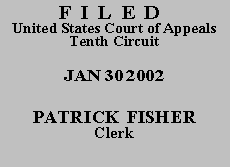

| RANDALL BELLAMY,
Plaintiff-Appellant, v. LARRY G. MASSANARI,(*) Acting Commissioner of the Social Security Administration, Defendant-Appellee. |
|
Claimant Randall Bellamy appeals from the district court's order affirming the decision of the Commissioner of Social Security. In that decision, the Commissioner determined that claimant was not entitled to disability insurance benefits and supplemental security income benefits under Titles II and XVI of the Social Security Act. See 42 U.S.C. §§ 423, 1382. We exercise jurisdiction under 42 U.S.C. § 405(g) and 28 U.S.C. § 1291, and affirm.
Claimant was awarded benefits commencing November 1, 1993, for disability due to severe alcoholism with secondary mental illness. At the time, the Commissioner noted that "[b]ut for [claimant's] substance abuse," there would be no "finding of disability in this case" and that claimant's "alcoholism and drug [addiction] was a contributing factor material to [the] disability decision." Appellant's App., Vol. 4 at 250. In 1996, Congress amended the applicable statutory standards. Under the amended provisions, "[a]n individual shall not be considered to be disabled for purposes of this subchapter if alcoholism or drug addiction would (but for this subparagraph) be a contributing factor material to the Commissioner's determination that the individual is disabled." 42 U.S.C. §§ 423(d)(2)(C), 1382c(a)(3)(J). The implementing regulations specify: "If we find that you are disabled and have medical evidence of your drug addiction or alcoholism, we must determine whether your drug addiction or alcoholism is a contributing factor material to the determination of disability." 20 C.F.R. §§ 404.1535(a), 416.935(a). The relevant inquiry became "whether [the Commissioner] would still find you disabled if you stopped using drugs or alcohol." Id., §§ 404.1535(b)(1), 416.935(b)(1).
Subsequently, claimant was notified that, in accordance with the amended statutes, his benefits would cease. Claimant alleged that his disability existed independent of his drug or alcohol addiction. After a hearing held February 6, 1998, an administrative law judge (ALJ) found that excluding the effects of claimant's substance abuse, he has the residual functional capacity to perform a range of medium work and that a significant number of jobs existed in the national economy which claimant could perform.(1) Accordingly, the ALJ determined that claimant was not under a disability as defined in the Social Security Act. Claimant sought review in the district court, which affirmed the denial of benefits.(2) He now appeals.
In this court, claimant essentially challenges the ALJ's findings of facts. He asserts that the ALJ erred in finding: (1) that he has only one severe impairmentanxiety disorder; (2) that his alleged impairments do not meet or equal listings for schizophrenia, paranoia or other psychotic disorders; and (3) that he has the residual functional capacity to perform jobs existing in significant numbers in the national economy, without sufficient consideration of his alleged agoraphobia or his ratings on the Global Assessment of Functioning scale.(3) Claimant also asserts error in the ALJ's evaluation of his credibility.
We review the agency's decision on the whole record to determine only whether the factual findings are supported by substantial evidence and the correct legal standards were applied. Goatcher v. United States Dep't of Health & Human Servs., 52 F.3d 288, 289 (10th Cir. 1995). We may not reweigh the evidence or substitute our judgment for that of the agency. See Kelley v. Chater, 62 F.3d 335, 337 (10th Cir. 1995). "Credibility determinations are peculiarly the province of the finder of fact," and should not be upset if supported by substantial evidence. Kepler v. Chater, 68 F.3d 387, 391 (10th Cir. 1995) (quotation omitted).
After carefully reviewing the record, we conclude that, contrary to claimant's contentions, there is substantial evidence to support the Commissioner's determination that claimant's drug or alcohol addiction is a contributing factor material to his disability. For substantially the reasons stated in the thorough order of the magistrate judge, filed March 26, 2001, we AFFIRM.
Entered for the Court
Circuit Judge
*. On March 29, 2001, Larry G. Massanari became the Acting Commissioner of Social Security. In accordance with Rule 43(c)(2) of the Federal Rules of Appellate Procedure, Mr. Massanari is substituted for William A. Halter as the appellee in this action.
**. This order and judgment is not binding precedent, except under the doctrines of law of the case, res judicata, and collateral estoppel. The court generally disfavors the citation of orders and judgments; nevertheless, an order and judgment may be cited under the terms and conditions of 10th Cir. R. 36.3.
1. Limitations found by the ALJ included "only occasional handling with the right dominant hand; no contact with the public and only occasional contact with co-workers; and no production quotas, with only repetitive work involving simple instructions." Appellant's App., Vol. 2 at 19, 22.
2. The parties consented to proceed before a magistrate judge in accordance with 28 U.S.C. § 636(c).
3. The Global Assessment of Functioning, or GAF, scale is used by clinicians to report an individual's overall level of functioning. See American Psychiatric Assoc., Diagnostic and Statistical Manual of Mental Disorders 34 (4th ed. 2000). The scale does not evaluate impairments caused by physical or environmental factors. See id.